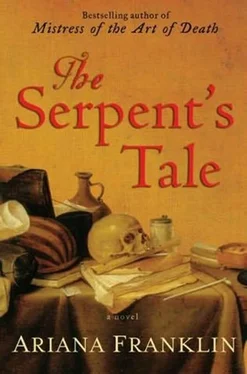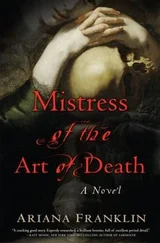“Is it his? He can’t be here. Jesus save us, is he here ?”
The slam of the door cut off their voices.
Adelia rolled off the bed and groped her way across the floor to one of the windows, her tied hands searching outside the sill for its remnant of snow. She found some and shoved it into her mouth. Another window, more snow into the mouth, scrubbing her teeth with it, spitting. More, for the face, nostrils, eyes, hair.
She went from window to window. There wasn’t enough snow in the world, not enough clean, numbing ice…
Drenched, shaking, she slumped into Rosamund’s chair, and with her pinioned hands still scrubbing at her neck, she laid her head on the table and gave herself up to heaving, gasping sobs. Uninhibited, like a baby, she wept for herself, for Rosamund, Eleanor, Emma, Allie, all women everywhere and what was done to them.
“What are you bawling for?” a male voice said, aggrieved. “You think that’s bad? Try spending time cooped up in a shithole with Dakers for company.”
A knife ripped the rope away from round her hands. A handkerchief was pushed against her cheek. It smelled of horse liniment. It smelled beautiful.
With infinite care, she turned her head so that her cheek rested on the handkerchief and she could squint at him.
“Have you been in there all the time?” she asked.
“All the time,” the king told her.
Still with her head on the table, she watched him walk over to the bed, pick up his cloak, and replace it carefully over the corpse. He went to the door to try its latch. It didn’t move. He bent down to peer through the keyhole.
“Locked,” he said, as if it was a comfort.
The ruler of an empire that stretched from the border of Scotland to the Pyrenees was in worn hunting leathers-she’d never seen him in anything else; few people did. He walked with the rolling bandiness of a man who spent more time in the saddle than out of it. Not tall, not handsome, nothing to distinguish him except an energy that drew the eye. When Henry Plantagenet was in the room, nobody looked anywhere else.
Deeper lines ran from his nose to the corners of his mouth than had when she’d last seen him, there was a new dullness in his eyes, and his red hair was dimmer; something had gone out of him and not been replaced.
Relief brought a manic tendency to giggle. Adelia began rubbing her wrists. “Where are your men, my lord?”
“Ah, well there…” Grimacing, he came back from the door and edged round the table to peer cautiously out. “They’re on their way, only a few, mind, but picked men, fine men. I had a look at the situation in Oxford and left young Geoffrey to take it before he moves on to Godstow.”
“But…did Rowley find you? You know the queen is at Godstow?”
“That’s why Geoffrey’ll take it next,” he said irritably. “He won’t have any trouble in either place. The rebels, God rot ’em, I’ll eat them alive, were practically running up the white flag at Oxford already, so…”
“My daughter’s at Godstow,” she said. “My people…”
“I know, Rowley told me. Geoffrey knows, I told him. Stop wittering. I’ve seen snowmen with more defensive acumen than Wolvercote. Leave it to young Geoffrey.”
She supposed she’d have to.
He glanced round. “How is little Rowley-Powley, anyway? Got a tooth yet? Showing a flair for medicine?”
“She’s well.” He could always melt her. But it would be nice to get out of here. “These picked men of yours…” she said. This was Rowley all over again. Why didn’t they ever bring massed troops?
“They’re on their way,” he said, “but I fear I outstripped them.” He turned back to the window. “They’d told me she still wasn’t buried, you see. My lads are bringing a coffin with them. Buggers couldn’t keep up.”
They wouldn’t have; he must have ridden like a fiend, melting the snow in front of him, to say good-bye, to mend the indecency inflicted on his woman.
“Hadn’t long arrived before you turned up,” he said. “Heard you coming up the stairs, so Dakers and I beat a retreat. First rule when one’s outnumbered-learn the enemy’s strength.”
And learn that Rosamund, in her stupidity and ambition, had betrayed him. Like his wife, like his eldest son.
Adelia felt an awful pity. “The letters, my lord…I’m so sorry.”
“Don’t mention it.” He wasn’t being polite; she mustn’t refer to it again. Since he’d covered the corpse, he hadn’t looked at it.
“So here we are,” he said. Still cautious, he leaned out. “They’re not keeping much of a watch, I must say. There’s only a couple of men patrolling the courtyard-what in hell are the rest doing?”
“They’re going to fire the tower,” she told him, “and us in it.”
“If they’re using the wood in the hall, they’ll have a job. Wouldn’t light pussy.” He leaned farther out of the window and sniffed. “They’re in the kitchen, that’s where they are…something’s cooking. Hell’s bollocks, the incompetent bastards are taking the time to eat.” He loathed inefficiency, even in his enemies.
“I don’t blame them.” She was hungry, she was ravenous. A magic king had skewed this death chamber into something bearable. Without sympathy, without concession to her as a woman, by treating her as a comrade, he had restored her. “Have you got any food on you?”
He struck his forehead with the heel of his hand. “Well, there, and I left the festive meats behind. No, I haven’t. At least, I don’t think so…” He had a pocket inside his jacket and he emptiedits contents onto the table with one hand, his eyes still on the courtyard.
There was string, a bradawl, some withered acorns, needle and twine in a surprisingly feminine sewing case, a slate book and chalk, and a small square of cheese, all of them covered in oats for his horse.
Adelia picked out the cheese and wiped it. It was like chewing resin.
Now that she was more composed, events were connecting to one another. This king, this violent king, this man who, intentionally or not, had set on the knights that stirred Archbishop Becket’s brains onto the floor of his cathedral, had sat quietly behind a hanging and listened, without sound, without moving, to treachery of extreme magnitude. And he’d been armed.
“Why didn’t you come out and kill him?” she asked, not because she wished he had but because she truly wanted to know how he’d restrained himself from it.
“Who? Eynsham? Friend to the Pope? Legate maleficus ? Thank you, he’ll die, but not at my hand. I’ve learned my lesson.”
He’d given Canterbury to Becket out of trust, because he loved him-and from that day his reforms had been opposed at every turn. The murder of the Jew-hating, venomous, now-sainted archbishop had set all Christendom against him. He’d done penance for it everywhere, allowing the monks of Canterbury to whip him in public, only just preventing his country from being placed under the Pope’s interdict banning marriage, baptism, burial of the dead…
Yes, he could control his anger now. Eleanor, Young Henry, even Eynsham, were safe from execution.
Adelia thought how strange it was that, locked in a chamber with a man as helpless as herself, at the top of a tower that any minute could be a burning chimney, she should be at ease.
He wasn’t, though; he was hammering the mullion. “Where are they, in God’s name? Jesus, if I can get here fast, why can’t they?”
Because you outstripped them, Adelia thought. In your impatience, you outstrip everybody, your wife, your son, Becket, and expect them to love you. They are people of our time and you are not; you see beyond the boundaries they set; you see me for what I am and use me for your advantage; you see Jews, women, even heretics, as human beings and use them for your advantage; you envisage justice, toleration, unattainable things. Of course nobody keeps up with you.
Читать дальше











